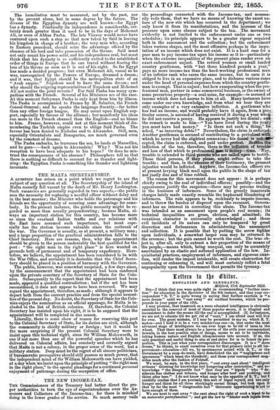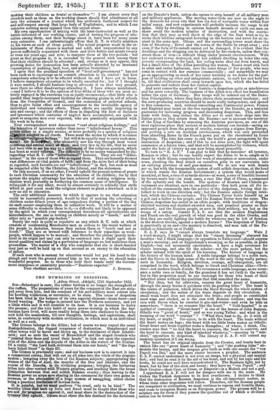Ittttro to tht Calor. EDUCATION AND IGNORANCE.
Milford, 17th September 1855. Sne—I think that you were quite right in recommending "further exer- tion" for education in the Spectator of the 8th instant, and that your cor- respondent "It. T." is quite wrong in saying that further exertion is "a mere dream" until we "cast away" six cardinal heresies, which he pro- pounds in your paper of the 15th. I may premise, that inasmuch as a more educated intelligence is obviously essential to the removal of most of these popular errors, it is illogical and inconsistent to defer the means till the end is accomplished. • If, for instance, we are not to educate till we get rid of "cant," I am afraid cant will live for ever. The great mistake, if I may be permitted to say so, which B. T. makes—and I hold it to be a very mischievous one—is, that under the most advanced stage of intelligence we can ever hope to be rid of tares in the wheat. That there must always be a leaven of the evils your correspondent bewails, in the best possible state of things, seems to me to be inevitable, taking human nature and English idiosyncrasies into account. If so, the only practical and useful thing to aim at and strive for is to lessen its pro- portion. This is just what your correspondent discourages. It is a "mere dream," he thinks, to exert ourselves even for that primary inlet to all im- provement—education—till we, by spontaneous accord with B. T., or the Government by a coup-de-main' have demolished the six " negligences and ignoranees" which beset the threshold ; and these your correspondent mag- nifies much after the fashion of Falstaff.
We must, he says, in the first place, "cast away cant about intelligent artisans' thirsting for knowledge and hungering after instruotion,"-arid ac- knowledge "the disagreeable fact" that they are " bipeds" who ". de- aiderate fine clothes and tobacco, and hunger after beef and pudding; and thirst after beer." I do not know what may be theetite of B. T., but I candidly confess that I am precisely this sort of biped myself, and not eitly hunger and thirst for all these shockingly carnal "rigs, but look upon it that by far the moat "disagreeable fact " thereunto appertaining isnot to
have enough of them. • '
We are next to cast away "the cant about the right of such abiped to be an autocratic paterfamilias "; and get the law to "hinder such bipeds from
making their children as brutal as themselves "I I am almost sorry that slanders such as these on the working classes should find admittance at all into the columns of a journal which has uniformly furthered respect for and self-respect among that large body. of Englishmen, and to which I can conceive nothing more opposed than this unjust abuse.
My own opportunities of mixing with the least-instructed as well as the better-informed of our working classes, and of testing the progress of edu- cation among them, and their feelings about it, have been for many years very extensive. I can unhesitatingly affirm that It. T. is wholly mistaken in his views on each of these points.. The actual progress made in the at- tainments 'of these classes is marked and solid, and unquestioned by any person sufficiently acquainted with them and their habits and minds twenty or even ten years ago, and now, to compare them at the two periods : but great as that progress if, it is exceeded by the general wish among them that their children should be educated • and, strange as it may appear, this growing desire for instruction has been actually attended by an increased consumption of pudding, beef, beer, and similar brutalities !
I agree that the practical operation of "local self-government" has not been such laa to encourage us to commit education to its control : but how compulsory schooling is to be effected without its aid I have yet to learn. I believe compulsory education to be wholly uncalled for ; but if I thought it were needed, I eliould hesitate long to advocate it on that very ground, were there no other disadvantage attending it. I have always maintained, —and I believe it to be the opinion of four-fifths of those who are most ac- tively engaged in the exertions you so justly recommend,—that little else is needed than largely-increased facilities for obtaining grants in aid of schools from the Committee of Council, and the restoration of endowed schools, thus to give fuller effect and encouragement to the invaluable agency of individual and voluntary efforts. Those efforts are rapidly improving in aim and energy ; and the effects of them in dispelling the host of darkness and ignorance which centuries of neglect have accumulated, are quite as great as sanguine men ever expected, who are practically acquainted with the work to be done.
Your correspondent next denounces "cant about religious feelings," and the toleration of ignorance rather than incur "infinitesimal heresy. This points either to a simply secular, or more probably to a species of religious ageption adapted to all creeds. These seem the modes by which it is easiest to ouirags•kkeetigioua feelings " : but will it be equally easy to carry such mea- sures? Sir Robeineel, who ultimately saw his way through most vexed questions and settled many oi--thein, said very late in. his life, that he never had been able to see his way to a settlement of the religious question, which has beset so many reforms. The difficulty is by no means vanquished by dis- regarding what R. T. calla "infinitesimal" heresies. They are not "infini- tesimal" in the eyes of those Who so regard them. They are honestly deemed vast differences on vital points of faith; and from the mere fact of their being so regarded, such heresies are not-" infinitesimal" in fact, but such as must be respected alike by the Christian, the Liberal, and the statesman. On this account, if on no other, I would uphold the present system of grants to each Christian community for the education of its children ; for by. that system the mighty advantage has been achieved of making religious secta- rianism work peaceably in furthering the common cause of intelligence. To relinquish it for any other, would be almost certainly to rekindle that strife which in past years made the religious element as great a drawback as it is now an aid to education.
The only additional measure by which it appears to me that education could be successfully promoted, would be that of making the schooling of children under fifteen years of age:compulsory during a portion of the day
on each master employing them in collective work, It will be a matter of some difficulty to reconcile them to it,—a difficulty not likely to be appeased by the spirit in which your correspondent denounces all agriculturists and manufacturers, the one as looking on children merely as "hands," and the 'other only as "possible pig-feeders."
Surely the cant isquite as repulsive as any which R. T. rails at which consists of condemning Manchester men as callous to the moral welfare of the people in factories, because they reckon them as "hands and not as heads." They are so termed with reference to their capacities as work- people, which happen to be manual ; and therefore the phrase (purely tech- meal in its origin and use) can only be construed into a slight upon their moral qualities and claims by a perversion of language no less malicious than groundless. The master of & ship who complains that she is short-handed may just as well be held up on that account as an enemy to the education of sailors.
If each man who is earnest for education would but put his band to the plough and work the ground around him in his own way, we should make wonderful progress. As to those who hold their hands until the Govern- ment integssses or unanimity prevails—" Rusticus expectat!"



























 Previous page
Previous page